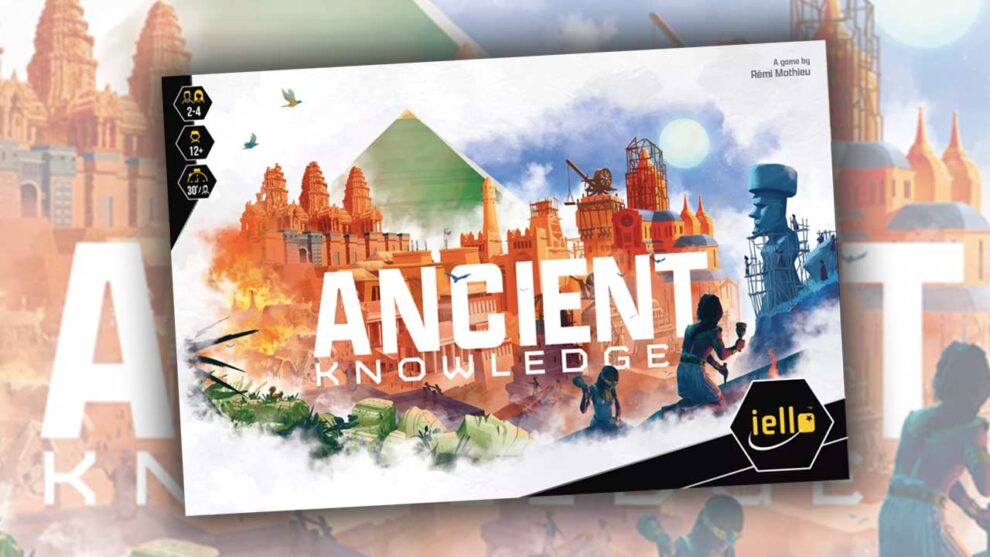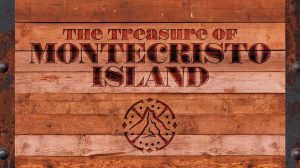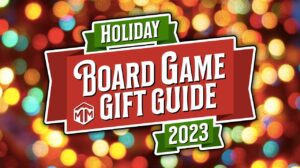I love tableau building games.
Certainly, I love the classics, particularly Race for the Galaxy, Dominion, and Terraforming Mars. Ark Nova is nearly at the top of BGG’s game rankings for the same reason. Any time I can play a game where I can collect a bunch of cards to then play them to the table and trigger a bunch of powers, one-time effects, and end-game scoring bonuses based on set collection, I’m going to play it to see if I like it.
Ancient Knowledge (2023, IELLO) does a lot of things well. This new tableau builder, designed by Rémi Mathieu, keeps things so simple that the game can be taught using only its double-sided, poker card-sized player aid. But with nearly 200 different cards that can be built, Ancient Knowledge has a great variety in its cardplay and its system provides a few ways to win for creative players.
Across three plays (two at three players, one at two players), Ancient Knowledge has proved to be very entertaining. I just wish I didn’t have to house-rule the ending condition.
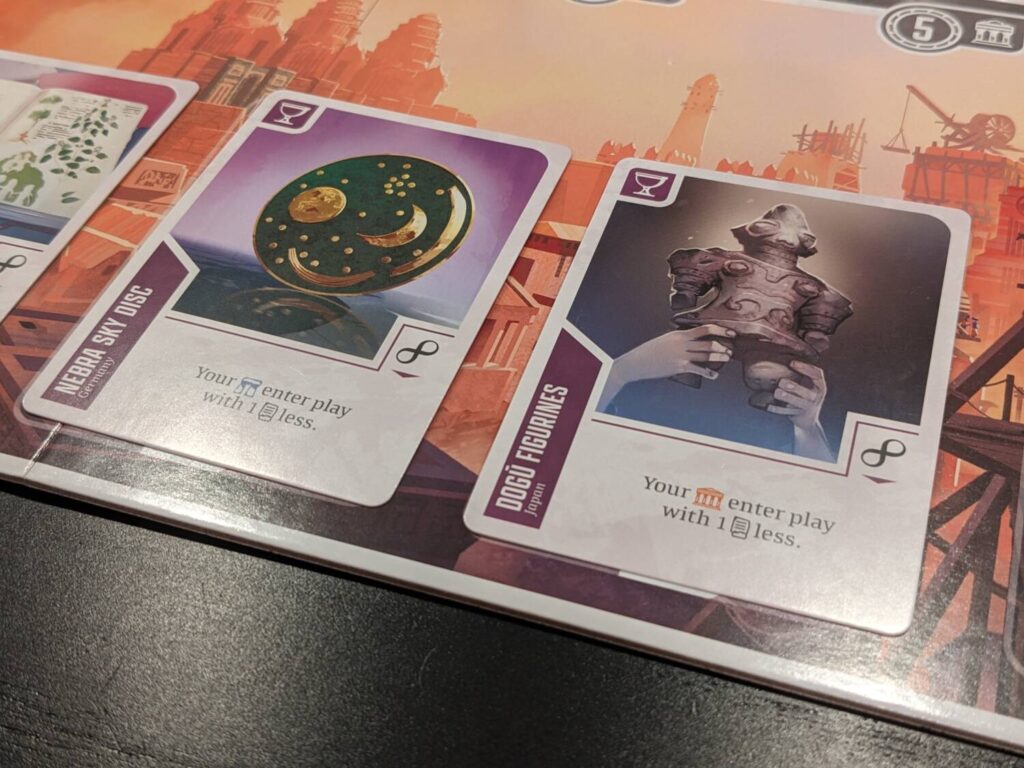
Goblets Are Gold
Ancient Knowledge is a hand management, card drafting tableau builder for 2-4 players. The game comes with individual and team competitive modes. For this review, I only tried the individual play mode (the team variant requires four players).
Each player manages their own player board and a hand of six cards to begin the game. This player board has space for five artifacts. Symbolized by cards with a purple goblet in the upper left-hand corner, artifacts grant the owner ongoing player powers. Across the top of the player board are six slots representing your civilization’s Timeline. This is where new cards are built (“created”, in the game’s vernacular) based on the Timeline number on each card. This initial placement can be adjusted up or down by spending cards from hand.
The cards that go into the Timeline are known as monuments. Monuments come in one of three suits. City cards (orange) usually provide a bunch of end-game points. Megalith cards (blue, with an arch in the upper left-hand corner) grant instant bonuses. Pyramid cards (green) give the player a mix of options, including boosts to card draw actions, end-game scoring boosts, set collection powers if a player leans into one flavor of monument, and other odds and ends.
Each monument card enters play with a certain number of Knowledge tokens. Ideally, you want to remove as many of those tokens off each card as possible, because when each monument card slowly moves towards “the past” (to the left on your Timeline), it will eventually fall into Decline. Thematically, the game’s lore plays it like your population wants to capture as much knowledge as possible from various monuments before these secrets are lost to time. I’ll admit that I didn’t care that much about the “why” as much as I love the idea that I’ve gotta pull these tokens off the cards as quickly as I can!
Cards in Decline score end-game points, but any Knowledge tokens that were on those cards when they fall off the Timeline are worth negative points at the end of the game. Luckily, there are many ways to get those tokens off of your board if the Knowledge is lost, and the game even features cards and technologies that reward the collection of lost Knowledge. There are lots of interesting twists on the word “negative” with Ancient Knowledge.
So, you’re building a tableau to trigger a bunch of powers that get you more cards, grant you more points, and combo in delicious ways. You do all of this with a simple two-action turn, selecting one of the game’s five actions (build cards, learn technology, remove Knowledge tokens, draw a lot of cards, or draw a single card) then doing some clean-up and triggering more card powers.
The game ends on the turn when the active player has 14+ cards in Decline. This condition ends up being the Achilles heel of Ancient Knowledge…the game overstays its welcome.
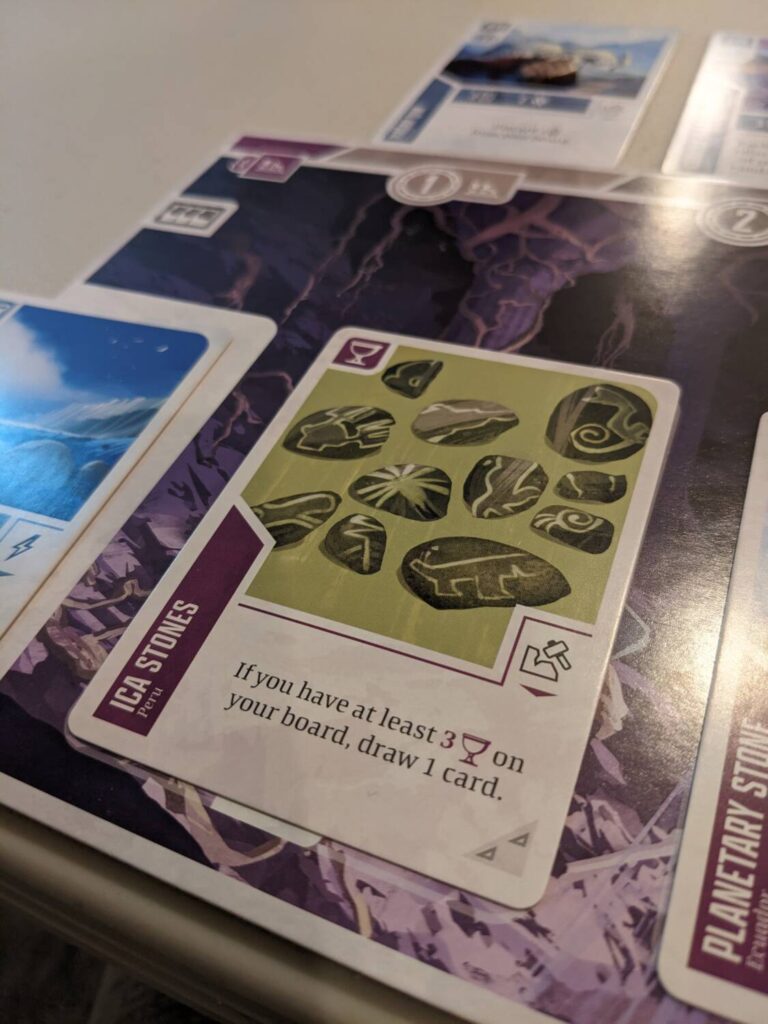
House Rule That Ending
Ancient Knowledge does a lot of things very well. The card chaining here feels really good. By my second game, I had a good feel for how to find ways to build a card-draw engine, a Knowledge token removal engine, and ways to efficiently draw a large hand of cards with the cards in my Decline area (that’s the way to use the better of the game’s two available draw cards actions).
I really enjoy the idea that I’m building a temporary tableau here, too. Because cards in Decline no longer have active powers, the only active powers you have to worry about are the cards in your Timeline and the Artifact cards. Each game, someone has pulled off a few clever maneuvers to ensure that certain monuments are adjacent to other monuments to remove Knowledge tokens. There are even a couple of supposedly-stabby cards that affect opponent card hands or their tableau cards. I like this. Otherwise, there would be zero interaction in this game, and as it is, you get just a touch of it with the included cards.
The technology board is great, too. Many of the technology cards are free, play into some nice set collection elements, and provide a boost for end-game scoring if there aren’t other valuable things to do late in the game. In one of my plays, I spent my final three turns only grabbing three- and four-point technology cards because I met so many different conditions on the cards in the tableau. That can be a big difference, but more importantly this provides flexibility for a player that has a bad card draw or two late in the game.
The accessibility for Ancient Knowledge is exceptional. The cards have a clean look, with powers that are very easy to understand. The iconography, denoting when cards trigger, is perfect and it’s easy to tell at a glance (at least, across a small table) the worth of player cards in their Timeline and the token they will need to move out to avoid penalties. And with the main cards, there are four starter decks of six cards each, so beginners can get rolling quickly by being handed a set and not be forced to draw 10 cards then drafting six that may or may not align.
And that player aid! It’s all you need to get rolling. One side has all of the game’s five actions, and the other side has the round structure. Because the point icon is so distinct, end-game scoring is easy to do and is appropriately not detailed on these player aids. In a perfect world, there would be icon guides for each player, but we opened the back of the manual and kept that page open in each of my plays when players did have a question or two.
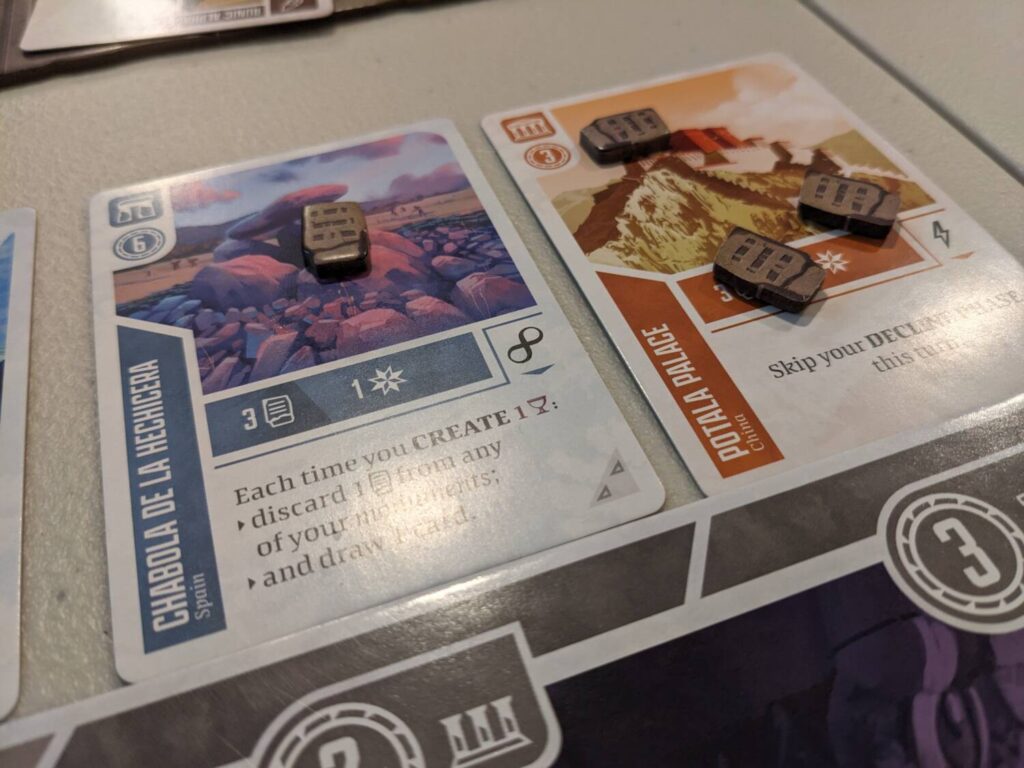
So, as a production, Ancient Knowledge works. As a snappy tableau builder, it also works. Reciting all of my triggered powers to the table, even during my third review play, still felt good. Unfortunately, Ancient Knowledge has one glaring issue: the playtime.
The box says 30 minutes per player, which sounded long even when I ripped off the shrink. In practice, I’m glad I didn’t do four-player games of Ancient Knowledge, because two hours for a game with short turns is way too long. The folks on the Game Brain podcast like to pose a question: “Is the juice worth the squeeze?”
With Ancient Knowledge, it is, if you house-rule the end condition. In one of our plays, I changed the rules: we played until someone had 10 cards in their Decline area, instead of 14. Massive difference. Scores were lower, but there was still plenty of time to achieve an appropriate range of end-game scoring conditions. Nothing drags. The game was over in an hour with three players.
At an hour, Ancient Knowledge becomes a better fit for a wider variety of gamers. The cardplay still works but nothing really drags.
Ancient Knowledge is solid, and it gets better with a shorter playtime. Tableau builder fans, give this one a look!


